Khmer Democratic Party គណបក្សប្រជាធិបតេយ្យខ្មែរ | |
|---|---|
 | |
| Leader | Uk Phourik |
| Founded | March 1998 |
| Political position | Centre-right |
| National Assembly | 0 / 123 |
| Senate | 0 / 57 |
The Khmer Democratic Party (KDP) is a Cambodian political party.
Khmer Democratic Party គណបក្សប្រជាធិបតេយ្យខ្មែរ | |
|---|---|
 | |
| Leader | Uk Phourik |
| Founded | March 1998 |
| Political position | Centre-right |
| National Assembly | 0 / 123 |
| Senate | 0 / 57 |
The Khmer Democratic Party (KDP) is a Cambodian political party.
This political party supports the belief that while illegal immigrants and even those ‘’from Vietnam’’ who ‘’take jobs from Cambodians’’ are destructive to Cambodia. The KDP’s leader Uk Phourik says he and his party do not support the ideology of ‘’anti-immigration’’ however he and the Khmer Democratic Party support and promote the belief that ‘’all immigrants’’ must ‘’on a case by case basis’’ need to become citizens only ‘’by royal decree’’ in order to live in Cambodia where they could constructively contribute to Cambodia as well.
Other ideologies the Khmer Democratic Party promotes and supports are human-rights ‘’particularly for women and children’’ and giving unlimited support to ‘’a free market economy’’ and also being unbiased by supporting and ‘’co-operating’’ with all the countries of the world ‘’regardless of their socio-political policies.’’ Apart from that there is also the party supports the belief of all Cambodians having control over their country by ‘’sovereignty.’’ [1]
Other ideologies the party supports is for example its conservative support of cultural heritage and social morality as well as Constitutional law which means they oppose the following like thievery, drug and human trafficking, etc. [2]
Of the many television campaign programs showing political parties promoting their views, the Khmer Democratic Party got 1 hour 48 minutes which was more time on than the ruling Cambodian People's Party time which was 1 hour 43 minutes. [3] The KDP had come in seventh place in the 2008 Cambodian parliamentary elections with 32,386 votes with 1 seat. [4]
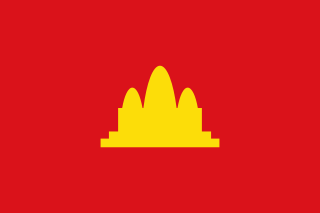
The Khmer Rouge is the name that was popularly given to members of the Communist Party of Kampuchea (CPK) and by extension to the regime through which the CPK ruled Cambodia between 1975 and 1979. The name was coined in the 1960s by then Chief of State Norodom Sihanouk to describe his country's heterogeneous, communist-led dissidents, with whom he allied after his 1970 overthrow.
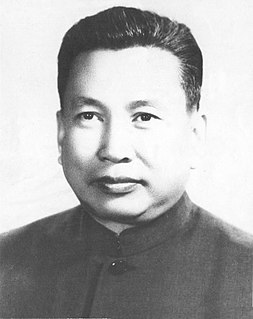
Pol Pot was a Cambodian revolutionary, dictator, and politician who ruled Cambodia as Prime Minister of Democratic Kampuchea between 1976 and 1979. Ideologically a Marxist–Leninist and a Khmer nationalist, he was a leading member of Cambodia's communist movement, the Khmer Rouge, from 1963 until 1997 and served as the General Secretary of the Communist Party of Kampuchea from 1963 to 1981. Under his administration, Cambodia was converted into a one-party communist state and perpetrated the Cambodian genocide.

The Kingdom of Cambodia, also known as the First Kingdom of Cambodia, and commonly referred to as the Sangkum period, refers to Norodom Sihanouk's first administration of Cambodia from 1953 to 1970, an especially significant time in the country's history. Sihanouk continues to be one of the most controversial figures in Southeast Asia's turbulent and often tragic postwar history. From 1955 until 1970, Sihanouk's Sangkum was the sole legal party in Cambodia.

Hun Sen is a Cambodian politician and former military commander who has served as the prime minister of Cambodia since 1985. He is the longest-serving head of government of Cambodia, and one of the longest-serving leaders in the world. He is also the president of the Cambodian People's Party (CPP) and a member of the National Assembly for Kandal. His full honorary title is Samdech Akka Moha Sena Padei Techo Hun Sen.

The National United Front for an Independent, Neutral, Peaceful and Cooperative Cambodia, commonly referred to as FUNCINPEC, is a royalist political party in Cambodia. Founded in 1981 by Norodom Sihanouk, it began as a resistance movement against the People's Republic of Kampuchea (PRK) government. In 1982, it formed a resistance pact with the Coalition Government of Democratic Kampuchea (CGDK), together with the Khmer People's National Liberation Front (KPNLF) and the Khmer Rouge. It became a political party in 1992.

The Cambodian People's Party (CPP) is a Cambodian political party which has ruled Cambodia since 1979.

Norodom Ranariddh was a Cambodian politician and law academic. He was the second son of King Norodom Sihanouk of Cambodia and a half-brother of King Norodom Sihamoni. Ranariddh was the president of FUNCINPEC, a Cambodian royalist party. He was also the First Prime Minister of Cambodia following the restoration of the monarchy, serving between 1993 and 1997, and subsequently as the President of the National Assembly between 1998 and 2006.
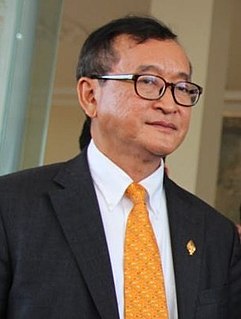
Sam Rainsy is a Cambodian activist, economist and politician who most recently served as the Leader of the Opposition. He is now the interim leader of the Cambodia National Rescue Party due to the continued ban on political activity by the party's leader, Kem Sokha.

The Cambodian–Vietnamese War, known in Vietnam as the Counter-offensive on the Southwestern border, and by Cambodian nationalists as the Vietnamese invasion of Cambodia, was an armed conflict between Democratic Kampuchea, controlled by the Khmer Rouge, and the Socialist Republic of Vietnam. The war began with repeated attacks by the Liberation Army of Kampuchea on the southwestern border of Vietnam, particularly the Ba Chuc massacre which resulted in the deaths of over 3,000 Vietnamese civilians. On 25 December 1978, Vietnam launched a full-scale invasion of Kampuchea, and subsequently occupied the country and removed the government of the Communist Party of Kampuchea from power.

Kem Sokha is a Cambodian politician and activist who most recently served as the President of the Cambodia National Rescue Party (CNRP). He served as the Minority Leader, the highest-ranking opposition parliamentarian, of the National Assembly from December 2016 to January 2017, and previously as the First Vice President of the National Assembly from August 2014 to October 2015. He represented Kampong Cham as its Member of Parliament (MP) from 2008 to 2017. From 2007 to 2012, Kem was the leader of the Human Rights Party, which he founded.

Kampuchea, officially known as Democratic Kampuchea from 5 January 1976, was a one-party totalitarian state which encompassed modern-day Cambodia and existed from 1975 to 1979. It was controlled by the Khmer Rouge (KR), the name popularly given to the followers of the Communist Party of Kampuchea (CPK), and was founded when KR forces defeated the Khmer Republic of Lon Nol in 1975.

The United Nations Transitional Authority in Cambodia (UNTAC) was a United Nations peacekeeping operation in Cambodia in 1992–93 formed following the 1991 Paris Peace Accords. This was the first occasion in which the UN directly assumed responsibility for the administration of an outright independent state, rather than simply monitoring or supervising the area. The UN transitional authority organised and ran elections, had its own radio station and jail, and was responsible for promoting and safeguarding human rights at the national level.

General elections were held in Cambodia on 27 July 2008. The result was a victory for the ruling Cambodian People's Party, which won 90 of the 123 seats.
The Social Republican Party was a right-wing political party in Cambodia, founded by the then-Head of State Lon Nol in 10 June 1972 to contest the National Assembly elections of the Khmer Republic held on September 3, 1972.

The People's Republic of Kampuchea (PRK) was a partially recognised state in Southeast Asia supported by Vietnam which existed from 1979 to 1989. It was founded in Cambodia by the Kampuchean United Front for National Salvation, a group of Cambodian communists who were dissatisfied with the Khmer Rouge due to its oppressive rule of Cambodia and defected from it after the overthrow of Democratic Kampuchea, Pol Pot's government. Brought about by an invasion from Vietnam, which routed the Khmer Rouge armies, it had Vietnam and the Soviet Union as its main allies.

Vietnamese Cambodians refer to ethnic group of Vietnamese living in Cambodia or Vietnamese who are of full or partial Khmer descent. According to Cambodian sources, in 2013 there are about 15,000 Vietnamese people living in Cambodia. Vietnamese source said there are 156,000 people living in Cambodia, while the actual number could be somewhere between 400,000 and one million people, according to independent scholars. They mostly reside in southeastern parts of Cambodia bordering Vietnam or on boathouses in the Tonlé Sap lake and Mekong rivers. The first Vietnamese came to settle modern-day Cambodia from the early 19th century during the era of the Nguyễn lords and most of the Vietnamese came to Cambodia during the periods of French colonial administration and the People's Republic of Kampuchea administration. During the Khmer Republic and Khmer Rouge governments in the 1970s, the Vietnamese were targets of mass genocides; thousands of Vietnamese were killed and many more sought refuge in Vietnam. Ethnic relations between the Cambodians and Vietnamese are poor and the Vietnamese have been the main target of xenophobic attacks by political parties since the 1990s. Most of the Vietnamese are stateless residents of Cambodia and as a result they face difficulties in getting access to education, employment, and housing.
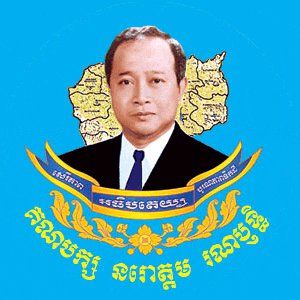
The Norodom Ranariddh Party was a Cambodian political party created by Prince Norodom Ranariddh, who left the royalist FUNCINPEC party of which he was previously President.
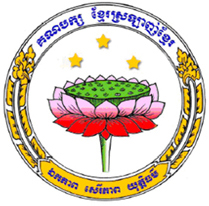
Khmer Loves Khmer Party is a Cambodian Political Party founded in 2008. It believes in democracy and ideas like in its slogan "Unity, Liberty and Justice". Therefore, its political position has broadened and represents many ideologies like some of the liberal oriented ideology since it believes in not big but smaller government can create “Significant changes and results can be obtained through smaller government”, helping to create changes and results from all the individuals that make up Cambodian society. The idea of people also having the "freedom of choice" in their lives means they can choose anything like food, healthcare, politics etc. which is a value of the KLKP's liberal ideology.

The Khmer Republican Party (KRP) is political party created on 11 March 2006. It participated in the 27 July 2008 elections under the leadership of Lon Rith.

The Communist Party of Kampuchea (CPK), also known as the Khmer Communist Party, was a communist party in Cambodia. Its leader was Pol Pot and its followers were generally known as the Khmer Rouge. Originally founded in 1951, the party was split into pro-Chinese and pro-Soviet factions as a result of the Sino–Soviet split with the former being the Pol Pot faction, and the latter adopting a more revisionist approach to Marxism. As such, it claimed 30 September 1960 as its founding date, then as the Workers' Party of Kampuchea before being renamed the Communist Party in 1966.